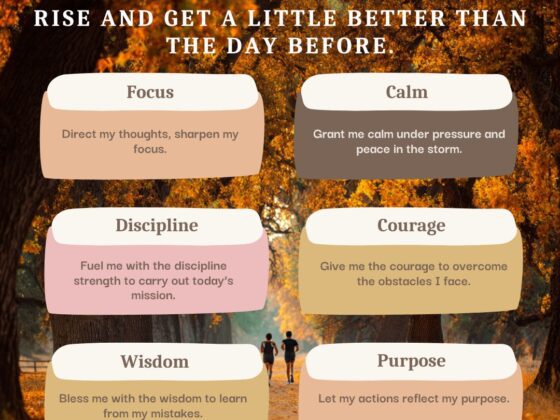“The road to success and the road to failure are almost exactly the same.”
Colin R. David
I have been thinking about this quote a lot lately.
I am focused on self-improvement and and I promote it in my newsletter and and on various platforms such as X and Instagram.
I am on a transformational journey.
I am not an expert. I am learning. I am trying to improve and build new systems that create discipline and success in my life.
There is lots of good advice online on how to become a better version of yourself.
An endless inventory of online classes exist to teach a systems, processes and methods that will help you improve your life and become successful.
I create some of this content myself.
I also am a consumer of much of this content.
I can say that today, I am a better person than I was in the past because I have taken self-improvement seriously.
I have been significantly influenced by content I have found in social media.
I have also be significantly influenced by a long series of books I have read over the years.
I have also been lucky to have a number of people in my life who have made a positive impact on me.
As a whole, the content that is promoting self-improvement is beneficial to many people.
There is a lot of great advice out there but even great advice can become bad advice if you try to apply it and it is not a good fit for your current situation or timing.
In an era where information is abundant and easily accessible online, it’s crucial to exercise due diligence and critically evaluate all advice we encounter.
Even if the advice is good, jumping in blindly can lead to poor decisions and negative outcomes.
While speed and execution are important we need ensure that the guidance we follow is both accurate and beneficial, leading to more informed and effective choices.
So slow down when reading people’s advice on line. Including mine.
Here areas you can think a little more about when looking at advice online.
1. Embracing your mistakes will solve everything
Many people talk about the benefits related to embracing your mistakes.
The quote below is typical of what you will see during your journey to self-improvement
“Only those who will risk going too far can possibly find out how far one can go.”
T.S. Eliot
The importance of embracing your mistakes is that we do not just learn from winning. We learn more from the mistakes me make.
We learn from mistakes because they provide valuable feedback and insights into what doesn’t work, allowing us to adjust our approach and improve.
Mistakes highlight gaps in our knowledge or skills. During our journey our mistakes force us to seek new information and develop better strategies.
They force us to travel down roads or think about things in ways we never considered before.
They also build resilience and adaptability, teaching us to cope with failure and persist in the face of challenges.
Not only does it help us deal with failure, it teaches us critical problem solving skills. There will always be new problems and challenges and the experience we gain through the process of making mistakes can applied to what comes at us next.
By reflecting on our mistakes, we gain a deeper understanding of ourselves and our goals, ultimately leading to personal growth and success.
This advice is valid, but there are mistake you might not recover from.
There has to be a balance be embracing your mistakes to grow and taking on too much risk.
The goal is to not let your fear of mistakes prevent your from moving forward while at the same time have the ability to evaluate the true risk of the decision you are making.
Consider John who is in the process of starting up a new company. He is strapped for cash but wants to start up a new coaching company to help men become better fathers. He wants to monetize the site by building up a coffee business branded with his coaching logo. He is is nervous about starting the company up because he has never done this before. He is afraid of making mistakes, but the advise he is getting is do not fear mistakes, just execute and you will learn from your mistakes.
Here are two possible scenarios he could follow to get his business up and running.
- Set up a small word press site, create a news letter and start to build a small community of users on X and instagram. Grow your user base and start to experiment with affiliate sales. As your user base grows, expand in to selling digital products. Crowd source you logo by running an online logo design contest. Execute various marketing campaigns, and use the profits from your company to start building your coffee business.
- Research and purchase a coffee roasting machine from a popular coffee manufacture. Select to best option available, you do not have cash so take a home equity loan to fund the project. Start to build your web site and build you social media presence. Start selling your coffee.
Both these options have the opportunity for making ma
Do not let the online advice force you to make the self-destructive decision.
Just because embracing mistakes is a great way to overcome your fear of getting started on something like starting a business.
That advice is not recommending you risk your life savings and home just to overcome a fear of mistakes.
Losing your life savings or home is a mistake you cannot recover from.
Be smart and evaluate the true risks before you kick you fears aside and learn from the mistakes that lie ahead.
2. You control your destiny and it is all up to you
“God, grant me the serenity to accept the things I cannot change, courage to change the things I can, and wisdom to know the difference.”
Reinhold Niebuhr
At some level we do control our own destinies.
A lot of the self-help messaging online focuses on things like discipline, consistency, focus, self-control, learning, and building your skill stack.
This advice is spot on.
All these items will help you improve, help you build experience, and will improve you odds of finding success.
There will be events we cannot control and obstacles that we cannot overcome.
The amount of discipline, hard work, learning and consistency sometimes does not matter.
Does that mean you give up on your goals and dreams? No, you have to find a different path.
They point that I am trying to get across is that while we are the biggest contributor to our destiny, there are things we just cannot control.
You will lose sometimes even if you are disciplined, consistent and hard-working.
That is just life.
If you blindly believe that you 100% control your destiny, you might loose home when you come across something you cannot change.
Find the balance during your journey.
Be prepared to come to terms with there are somethings that we cannot control.
That does not mean that you give up.
You adjust, review other options, then you get back to it.
3. Only you can get it done, you are on your own.
“I have seen that in any great undertaking it is not enough for a man to depend simply upon himself.”
Shooter Teton Sioux
You will often see very powerful quotes on X and Instagram highlighting things like you can only depend on yourself to get something done.
When you consider things like self-discipline, responsibility and personal growth, relying on ourselves for accountability is crucial.
We have to hold ourselves accountable.
We have take ownership of our actions and decisions.
This leads to a greater sense of control over our lives which in turn creates self-reliance, confidence and resilience.
Having self-reliance, confidence and resilience are tools that enable us to navigate challenges and setbacks more effectively.
By setting and meeting our own standards, we ensure consistency and integrity in our pursuits, which can inspire trust and respect from others.
Ultimately, self-accountability empowers us to achieve our goals and fulfill our potential, as we are motivated by our inner drive rather than external pressures.
All these items are extremely important in our journey to self-improvement and becoming a better version of ourselves.
I try practice this kind of accountability but I also step back and optimize it for my own personal situation.
In our life journey, we often encounter people who impact us in different ways. The goal is to surround yourself with people who challenge you to become a better version of yourself. They should uplift and inspire you to focus on your personal growth. Their positive support can help fuel your ambition, boost your confidence, and help you reach new heights in your journey to success.
Ultimately, in most cases, we are probably the only ones that can hold ourselves accountable. But, I think many opportunities can be missed if we ignore the input of others to hold ourselves accountable.
A statement like, “you can only depend on yourself,” in the end” oversimplifies the approach to accountability.
Hold yourself accountable, but keep open to the input from others that pushes your accountability to a higher level.
4. Success it automatic if you work hard
“Sometimes you can do everything right and things will still go wrong. The key is to never stop doing right.”
Angie Thomas, The Hate U Give
There are so many online quotes that promise success if you work hard.
“Put in the work, and success is inevitable. Hard work never goes unrewarded!”
“If you’re willing to put in the effort, success is just a matter of time. Keep hustling!”
“Success is not a matter of ‘if’ but ‘when’—as long as you keep working hard. Stay dedicated!”
“The secret to guaranteed success? Relentless hard work and unwavering determination.”
“Success is assured for those who are willing to work for it. Keep pushing forward!”
We have all seen posts like this in X and other platforms.
Hard work often results in success.
Sometimes it does not.
To blindly follow online advice that hard work will always lead to success can lead to a feeling of failure that you cannot recover from if your expectations are wrong.
Failure can significantly set you back if your expectations are unrealistic or poorly aligned with reality.
If your expectation that working hard will only lead to success, and you have a failure, this can have a material impact to your confidence.
When individuals set overly ambitious goals without considering potential obstacles or limitations, failure can lead to disillusionment, loss of motivation, and financial or reputational damage.
You have to be realistic about what your hard work can really accomplish, and develop a mental frame work or system that prepare you for failure.
A good system would be one that tells you that it is possible that you will make mistakes and sometimes fail.
That same system would them tell you that those mistakes and failures are critical to you learning and creating the experience you need to someday become successful.
This allows you to modify you expectations and turn initial failures into long-term success.
A real-life example is the early ventures of entrepreneur Elon Musk with SpaceX.
In the early 2000s, SpaceX faced multiple failed rocket launches, nearly leading to bankruptcy. Musk’s initial expectation of quick success overlooked the complexities and challenges of space travel.
However, these failures prompted a reassessment of goals, leading to more realistic expectations and meticulous planning.
By adjusting their approach, SpaceX eventually achieved successful launches and revolutionized the space industry.
Do not blindly follow the advice that hard work automatically leads to success.
Instead, embrace the reality that hard work will increase your chances of success and mistakes along the way are opportunities to learn and create the experience you need to be successful.
5. You have to be productive every day
“Almost everything will work again if you unplug it for a few minutes, including you.”
Anne Lamott
I am sure you have all seen the posts on X, Instagram and other social media platform that emphasize the need for unending work to obtain your goals and become successful.
“Success requires relentless effort and constant hustle. No breaks, no excuses. Keep pushing forward!”
“If you want to be successful, you have to be willing to outwork everyone. No breaks, just pure dedication.”
I cannot argue that hard work can produce great results.
Additionally, a dependable formula for success is also outworking other people.
I just want to emphasize that is also okay to rest and do some fun stuff too.
Rest and regaining energy are crucial for enhancing overall performance and creativity.
Taking breaks allows the mind and body to recover, reducing stress and preventing burnout.
I would also mix in physical breaks like take short walks.
There is nothing like resetting your thoughts by taking a nice walk. When dealing with mental blocks, I can start to get some mental clarity if I take a 30——to 45-minute walk: no audiobooks, no music, just me and my thoughts. Walking with just your thoughts can become like a physical meditation session.
Walking, especially in nature, boosts creative thinking and problem-solving. One reason is that it creates a change in scenery and breaks our normal routine. When we are sitting around, we sometimes get stuck or in a mental funk. Movement changes our current mental state to a new one, and once we get going, we get ourselves “unstuck,” and execution can continue.
Taking breaks also can lead to improved focus, better decision-making, and heightened problem-solving abilities.
Additionally, rest fosters creativity by providing the mental space needed for new ideas to emerge and flourish.
By incorporating regular rest periods, individuals can maintain high levels of productivity, sustain your well-being, and unleash your full creative potential.
Conclusion
“Many receive advice, only the wise profit from it.”
Harper Lee
There is an endless list of opportunities to learn how to improve and become a better version of yourself online.
I have used various sources online to improve my performance, health, discipline and output. Every thing from better eating habits, improved exercised routines to better self-discipline.
Do not follow online guidance blindly. There is no magic solution for improving our situation on this great planet.
Step back and review the material you find online and think hard about how they apply to the goals you have for your life.
Approach every thing with balance and open to all the possible outcomes they may bring.
Success is never guaranteed and anything promising that should be approached with some level of skepticism. That does not mean that the information is not useful and cannot provide you with useful techniques that lead to eventual success. Just be prepared that all journey to success and improvement have their ups and down.
Learning is a continuous journey.
If you understand this, then you have the right mind set to improve your situation in life.
If you enjoyed this newsletter, please subscribe.
If you want to have a deeper discussion about this subject contact The Day Warrior.










